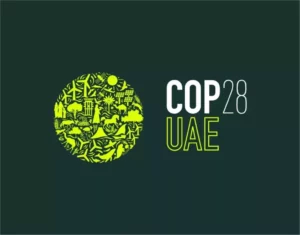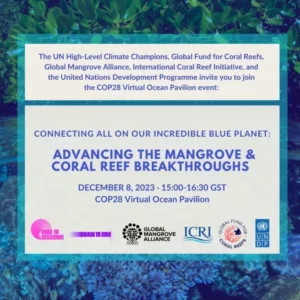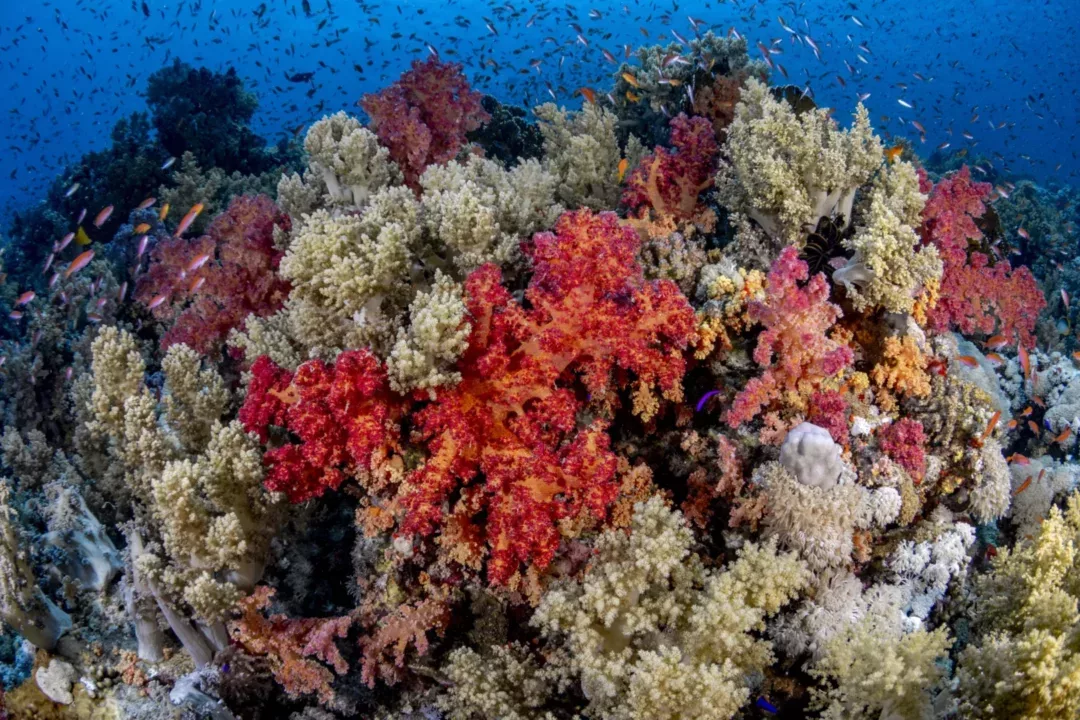The UN Climate Change Conference 2023 (UNFCCC COP28), will take place in Dubai, United Arab Emirates, from 30 November until 12 December 2023, to build on previous successes and pave the way for future ambition to effectively tackle the global challenge of climate change.
A wide range of events related to coral reefs and ocean health will be held during COP28. This page collates all relevant events #ForCoral.
If you wish to add an event, please contact us here.
This page is updated regularly as events are confirmed (last update: 27/11/23).

Official side events
The Climate-Forward Ocean Conservation Strategies to deliver on global targets
Location: Nature-Positive Pavilion, Blue Zone
Time: 11:00 – 12:00 (GST)
Organised by: This session will be hosted by Bloomberg Philanthropies, GFCR, The Nature Conservancy (TNC), the United Nations Environment Programme (UNEP), Race to Resilience, Ocean & Climate Platform, and the Global Mangrove Alliance (GMA).
Access: Event Registration Link.
Building the New, Blue Economy: Investing for Sustainable Oceans & Climate
Location: By invitation only
Time: 10:00 – 12:00 (GST)
Organised by: Hosted by the Prince Albert II of Monaco Foundation (PA2MF)
Access: invite-only for in-person participation
This high-level convening on the sidelines of COP28 aims to boost private investments in ocean-positive solutions and bridge the coral reef funding gap.
Sustainable Financing Model for Marine Protection and Production
Location: Indonesia Pavilion
Time: 10:00 – 12:00 (GST)
Organised by: This event, jointly organised by the Ministry of Marine Affairs and Fisheries RI, Ministry of Environment and Forestry RI, Conservation International, Konservasi Indonesia, GFCR, TNC, and Yayasan Konservasi Alam Nusantara.
Access: open to all
In the face of escalating climate change, it is vital for key stakeholders to bring together the “twin pillars” of ocean conservation: protection and production. This entails reinvesting economic gains from marine activities into safeguarding the marine environment, creating a sustainable cycle. This upcoming event, which will take place at the Indonesia Pavilion, aims to showcase Indonesia’s pioneering strategies for addressing climate change through a sustainable blue economy, including the GFCR reef-positive blended finance programmes in Indonesia as well as the Blue Halo S initiative. Additionally, this session will explore opportunities to harmonise marine-coastal protection and sustainable economic activities, fostering cooperation, knowledge exchange, and the potential for global replication.
A Solutions Toolbox to save coral reefs
Location: Ocean Pavilion, Blue Zone
Time: 14:00 – 15:00 (GST)
Organised by: Woods Hole Oceanographic Institution and co-hosted by the GFCR, International Coral Reef Society (ICRS), Coral Research and Development Accelerator Platform (CORDAP), Coral Restoration Consortium (CRC), and ICRI.
Access: open to all participants with Blue Zone accreditation
Economically valuable and biodiverse coral reefs are under threat from climate change and human-based activities. Recently, the Reef Solutions Toolbox, or the array of tools or solutions available to save coral reefs, has grown in size and comprehensiveness to support this global challenge. Join us as we present the array of science, financial, political, and community-based tools being developed and implemented to save coral reefs and discuss the still critical needs for climate neutrality, mitigating loss and damage of reefs and increased global coordination to meet this critical challenge.
The Coral Reef Breakthrough
Location: In person by invitation only
Time: 16:30 – 17:30 (GST)
Organised by: This event, led by the GFCR and in partnership with HLCC Race to Resilience, ICRI, UNEP, the United Nations Development Programme (UNDP), and UNCDF
Access: Please note, in-person attendance at this event is by invitation only. Join this event virtually: Event Registration Link.
The High-Level launch event of the 2030 Coral Reef Breakthrough will mark a watershed moment in global action to save the world’s most threatened ecosystem. The session will feature the championship of the Breakthrough by coral nations and ocean-action leaders, as well as presentation of its pivotal role in expanding the scale of actions and funding. The final segment of the event will offer an opportunity for further discussion on the road to achievement of Breakthrough targets among global change-makers, including private sector leaders, state representatives and policymakers, high-level UN officials, conservation actors, and renowned scientists.
Launching the Coral Restoration Consortium’s Storytelling Hub
Location: The Commonwealth Pavilion, Blue Zone
Time: 17:00 – 18:30 (GST) + Reception
Organised by: Coral Restoration Consortium
Access: open to all participants with Blue Zone accreditation
The event will include a short video documenting heroic restoration efforts and stories from leaders about what this loss of reefs means to them personally. Then the panel will discuss what is needed to make restoration work on an island-scale as well as globally. As the oceans continue to warm, this conversation is critical for those in our coastal communities, their livelihoods and their future.
Coral Action in a Sustainable Blue Economy Framework: The Case of the Red Sea
Location: Ocean Pavilion
Time: 17:00 – 18:00 (GST)
Organised by: Coral Research & Development Accelerator Platform (CORDAP)
Access: open to all with Blue Zone Accreditation
The Red Sea is one of the largest coral reef provinces in the world, supporting healthy corals that are not immune to the impacts of climate change. To achieve a sustainable blue economy in the Red Sea, Saudi Arabia has been leading the development of a strategy that includes domestic and international elements. Working collaboratively and generously with neighbouring nations is key to ensuring the Red Sea continues to support a healthy environment and thriving blue economy.
From pledges to Action for coral
Location: Science for Climate Action Pavilion
Time: 13:15 – 14:15 (GST)
Organised by: Coral Research & Development Accelerator Platform (CORDAP)
Access: open to all participants with Blue Zone accreditation
This event aims to underscore the interconnectedness of the GBF with coral restoration efforts, emphasising the role of healthy coral reefs in achieving sustainable seas and 30% of marine ecosystems recovering or under protection. Additionally, the session intends to foster collaboration among governments, organisations, and communities for the effective implementation of coral restoration projects in alignment with the GBF, through open discussions about the challenges, barriers, and innovative solutions in coral restoration within the framework of sustainable development.
Mobilising Industry and Society to Conserve and Restore Coral Reefs
Location: Science Pavilion
Time: 12:00 – 13:00 (GST)
Organised by: Coral Research & Development Accelerator Platform (CORDAP)
Access: open to all with blue zone accreditation
Coral reefs are facing unprecedented threats, including rising temperatures, pollution, overfishing, and habitat destruction. These factors are pushing these fragile ecosystems to the brink of collapse. The urgency to save corals is growing, and immediate action is required.
The current science and technology is insufficient to avoid projected catastrophic losses under climate change and meet the goals of the global biodiversity goals. A major global collaborative effort is urgently required to secure a future for coral reefs.
In this event, we advocate for a clear call to action: mobilising industry and society is vital to conserve and restore corals and reefs worldwide. However, the path to achieving this goal is not without its challenges. How can we effectively address these challenges and seize the opportunities in our fight to save corals?
This event will highlight the necessity for a creative, comprehensive, multilevel approach involving research institutions, industry, key stakeholders, and society. By integrating these diverse sectors, we can tackle the vital aspects of international collaboration, funding, and donor support, ultimately charting a course toward a future where coral reefs thrive.
COP28 Virtual Ocean Pavilion: Connecting All on Our Incredible Blue Planet
Location: Virtual
Time: 15:00 – 16:30 (GST)
Organised by: Jointly hosted by GFCR, GMA, ICRI, UNDP, and HLCC
Access: open to all
Pivotal to mobilising the action needed to deliver on the global ambitions of the Sharm el Sheikh Adaptation Agenda and the Global Biodiversity Framework, the Mangrove and Coral Reef Breakthroughs – established under the High-Level Climate Champions and the Marrakech Partnership for Global Climate Action Ocean Breakthroughs – collectively aim to:
1.) Secure the future of 15 million hectares of mangroves globally by 2030 by mobilising US$4 billion through joint action to halt mangrove losses, restore half of recent losses, double global mangrove protection, and ensure long-term sustainable financing for all existing mangroves; and
2) Secure the future of at least 125,000 km2 of shallow-water tropical coral reefs with investments of at least US$12 billion to support the resilience of more than half a billion people globally by 2030
Learn more about the Ocean Breakthroughs and how to join the efforts including discussions on critical issues pertinent to coral reef and mangrove conservation and restoration. This event seeks to elevate public awareness and support for the Breakthrough initiatives while harnessing the power of public engagement to catalyse climate action on a global scale.

ECOVALOR Side Event
Location: Cuba Pavilion
Time: 11:15 (GST)
Organised by: ECOVALOR
Report cards, a tool for communicating results in Tarea Vida, will feature the presentation of an audiovisual and the launch of the Report Cards of Coral Reefs and Forests of Cuba. The Life Task in its short name refers to the State Plan to Confront Climate Change in Cuba. This government plan is considered one of the main Cuban public policies that has defined as part of its main tasks the protection and conservation of Coral Reef and Forest ecosystems due to their important role in the face of the effects of Climate Change.
Harnessing the Power of Society and the Private Sector #ForCoral
Location: Ocean Pavilion
Time: 12:30–13:30 (GST)
Organised by: Coral Research & Development Accelerator Platform (CORDAP)
Access: Open to all with blue zone accreditation
Unheard Voices: Emerging Leadership in Coral Conservation and Restoration from the Global South
Location: Climate Action Pavilion
Time: 16:00–17:00 (GST)
Organised by: Coral Research & Development Accelerator Platform (CORDAP)
Access: Open to all with blue zone accreditation
This event aims to amplify the often overlooked voices of the Global South. These countries situated closer to the frontlines of coral reef degradation are developing or low-income countries that bear the brunt of the consequences while striving to lead in coral conservation and restoration efforts. Despite these challenges, the Global South has showcased remarkable pioneering approaches in coral conservation and restoration, inspiring the world with their resilience and innovative strategies. In this event, leaders, coral experts, and youth advocates will come together to acknowledge the invaluable contributions of the Global South on coral restoration and conservation and address the unique struggles in safeguarding corals and coral reefs.
Implementation Lab: Accelerating Nature-based Solutions for Coastal Resilience: Financing and Policy Tools
Location: Lab 1 (Al Shaheen)
Time: 16:00–17:00 (GST)
Organised by: The Ocean Risk and Resilience Action Alliance (ORRAA) and co-organized by Conservation International (CI) and Ocean & Climate Platform
Access: TBC
This upcoming roundtable, will delve into the practical implementation of nature-based solutions for coastal adaptation and resilience on a large scale. The event’s primary focus will revolve around financing, investment, and policy pathways. Real-world success stories of nature-based solutions for coastal resilience will be presented, along with strategies for taking these solutions beyond the conceptual stage. The discussion will also illuminate available policy and financing tools that can expedite these solutions, with a particular emphasis on the synergy between green-grey infrastructure and foundational financial mechanisms to establish a conducive environment.
The event is designed to involve a diverse range of stakeholders, including policy-makers, businesses, municipalities, regions, youth representatives, civil society, and indigenous peoples, ensuring a comprehensive and inclusive perspective.
Cold-Water Corals: Hidden Treasures in the Deep Ocean
Location: Science Pavilion
Time: 14:15–15:15 (GST)
Organised by: Coral Research & Development Accelerator Platform (CORDAP)
Access: Open to all with blue zone accreditation
Corals are usually associated with warm, tropical waters and exotic species, rather than cold, deep, and dark waters. However, deep and cold-water corals form impressive reefs and gardens, providing habitat, feeding grounds, and nurseries for many species, including commercially important fish. In fact, cold-water corals rival their tropical counterparts in terms of biodiversity and species richness. They are also known as indicator species for classifying vulnerable marine ecosystems due to their crucial role in supporting biodiversity.
Despite their significance, there are still significant gaps in our understanding of deep and cold-water corals. Accessing remote deep-sea ecosystems poses logistical and financial obstacles that have hindered research and active restoration efforts. We must spotlight deep and cold-water corals, bringing together experts, scientists, and advocates to discuss their importance, the challenges they face, and the way forward.
Join us in exploring the fascinating world of deep and cold-water corals to help protect these vital ecosystems.

